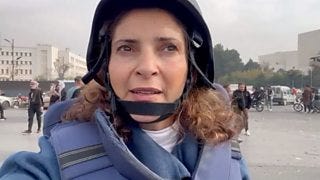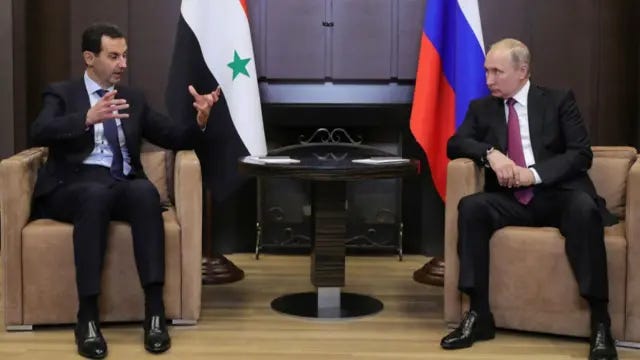Assad is in Moscow after fleeing Syria and will be given aslyum, Russian state media report
Reports also say that Assad and his family have been granted asylum by Russia.
Summary
Syria's former president Bashar al-Assad arrives in Moscow after fleeing Damascus, Russian state media report
Russia was a key ally of Assad's regime - the former president and his family will now reportedly get asylum there
Assad fled when rebel group HTS swept into the capital this weekend - earlier, rebel leader Abu Mohammed al-Jawlani addressed cheering crowds in a Damascus mosque
The BBC is the only western news organisation reporting from inside Damascus
I was metres way from Jawlani - seeing him in the heart of old Damascus felt surreal, writes our correspondent Feras Kilani
Our correspondents have witnessed crowds celebrating on the streets, and have watched while Syrians loot Assad's former residence
They have also heard explosions in Damascus - unconfirmed reports say Israel is striking the city, although Israel has not commented
Media caption,
Watch: In Umayyad Square as deafening gunfire rings out
Edited by Matt Spivey and Owen Amos, with Barbara Plett Usher and Lina Sinjab in Damascus
Deposed Syrian President Bashar al-Assad and his family have arrived in Moscow, Russian state media agencies report, citing sources in the Kremlin.
Reports also say that Assad and his family have been granted asylum by Russia.
Russia helped keep Assad in power - his departure is a blow for them
Steve Rosenberg
BBC Russia editor, in Moscow
It was Russian firepower that had helped keep Bashar al-Assad in power for the last nine years.
But, in a matter of days, the Kremlin's Syria project has unravelled, with Moscow, apparently, powerless to do anything about it.
The fall of the Assad regime is a blow to Russia's prestige.
By sending thousands of troops to shore up President Assad in 2015, one of Russia's key objectives had been to assert itself as a global power.
It was Vladimir Putin's first major challenge to the power and dominance of the West, away from the former Soviet space. And a successful one, too, so it seemed.
In return for military assistance, the Syrian authorities awarded Russia 49-year leases on the air base in Hmeimim and its naval base in Tartus. Russia had secured an important foothold in the Eastern Mediterranean. The bases became hubs for transferring military contractors in and out of Africa.
Assad was Russia's staunchest ally in the Middle East. The Kremlin had invested heavily in him. It had poured resources - financial, military, political - into keeping him in power. The Russian authorities will struggle to present his toppling as anything but a setback for Moscow.
The BBC





